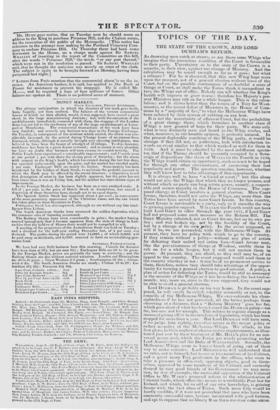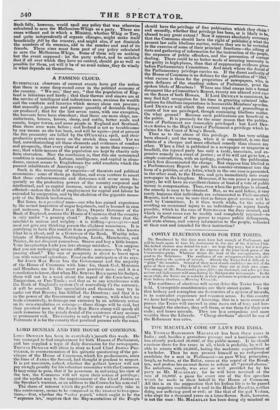TOPICS OF THE DAY.
THE STATE OF THE CROWN, AND LORD DURHAM'S RETURN.
As drowning men catch at straws, so are there some Whigs who imagine that the precarious condition of the Court is favourable to their party. Uncertainty as to the state of the Crown is a security, in their view, against any change of Ministry. And the calculation may be sound enough as far as it goes; but what a reliance ! For be it observed, that this new Whig hope rests upon the prospect, not of a general election without leave of the Court, but on the possible continuance of so doubtful a state of things at Court, as shall make the Tories think it inexpedient to turn the Whigs out of office. Nobody can tell whether the King's health will improve or grow worse : therefore his Majesty's pre- sent Ministers may rub on for a while longer. This is the calcu- lation; and it shows better than the return of a Tory for West- minster, or the recent defeat of Ministers in the House of Com- mons by a " majority of five," to what the Melbourne-Whigs have been reduced by their system of rubbing on any how.
It is not the uncertainty of affairs at Court, but the probability of a great change there, which furnishes to another class of Whigs a new ground of hope for their party. We state only what is very distinctly seen and heard in the Whig circles, and what, moreover, in our humble opinion, is perfectly natural. In the present deplorable condition of the Whig party, it would be strange if they did not, as politicians, look with satisfaction to- wards an event similar to that which worked so well for them in 1830. And it must be admitted by the most indifferent specta- tor, that if the Throne should be presently occupied by a Sove- reign of dispositions like those of WI sro am the Fourth in 1830, the Whigs would obtain an opportunity, such as is not to be hoped fur through any other circumstance, of recovering their lost popularity and power. The question remains, however, whether they will know how to take advantage of this opportunity.
It is always well to have " a friend at court ;" but this alone would not give the Whigs that which they no longer possess, and without which no party can long retain power, namely, a respect- able and secure majority in the House of Contemns. The sup- posed change at Court involves a general election. Mere Court favour, therefore, would not serve the Whigs, any more than the Tories have been served by mere Court favour. In this country, Court favour is serviceable to a party, only as it smooths the way to gaining popular support. WILLIAM the Fourth could not have kept Lord GREY in office through kite year 1831, if Lord Gams had not proposed some such measure as the Reform Bill. The GREY Ministry subsisted, not on Court favour, but on its own po- hey ; and was broken up, not by the hostility of the Court, but by a change of its OWil policy.. In the event supposed, so will it be, we are persuaded, with the Melbourne-Whigs. At present, they have no policy with which to go to the country. If they remain without a policy—without any plan of action for defeating their united and active foes—Court favour may, like the precariousness of things at Windsor, enable them to rub on for a while longer, but it will not sustain them in power. At present, they are afraid, as they well may be, of an appeal to the country. The event supposed would send them to the country whether or not : it can be of no permanent service to them, therefore, unless they should take advantage of the oppor- tunity for turning a general election to good account. A policy, a plan of action for defeating the Tories, would be still as necessary to the security of the Whigs as it has been duriog the last twelve- month; nay, more so, show in the case supposed, they %%mild not be able to avoid a general election.
Lord DUR II VII is prebably on his way home. In the event sup- posed, he will surely be called, whether ostensibly or not, to the councils of the Melhoutne-W higs. We over-estimate his clear- sightedness if he has not perceived, all the better perhaps from observing at a distance, that a " Reform Ministry" goes too far, which goes short of what has been termed the Dualism policy—too fur, because not fir enough. This relates to organic change as a means of giving tffi,ct to the machine of legislation, which has been stopped for more than a y ear. But Lord DURHAM will have seen, if' we judge him rightly, two other errors in the recent policy or rather no-policy of the Melhouroc-Whigs. We allude, in the first place, to t heir neglect of ad r iii ui strative improvements, as illus- trated just now hy their treatment of Mr. Ulises plan for an uni- versal pew -post, which the Tories are wisely promoting under Lord Asti iseieros and the Duke of WELLINGrosi. Secondly, the Melbourne-Whigs seem to have a knack of' going out of their way to make enemies. Lord MELnoruNE will understand that we refer, not to himself, but to one or two members of his Cabinet, and a great many Tory gentlemen in the offices, who seem to take a pleasure in offensively opposing objects, good in them- selves, a pprut ed by soine members of his Cabinet, and earnestly desired by very good friends of his Gevernment : we may men- tion, by way of example, the successful opposition of the Colonial Office to Mr. W's proposed reform itt the admiuistration of Colonial lands, which offers the means to a creditable Poor law for Ireland, and which, let us add of our own knowledgo, is gaining favour with the best class of Tories. Such mere folly would be hardly credible, if it were not proverbial that men who have been eminently successful once, become intoxicated with good fortune, and apt to suppose that no liberty fr mu them can ever come amiss. Such folly, however, would spoil any policy that was otherwise calculated to save the Melbourne-Whigs as a party. There are cases without end in which a Ministry, whether Whig or Tory, and quite independently of organic changes, might make itself beneficially felt by the country, and might also, if not diminish the numbers of its enemies, add to the number and zeal of its friends. These aims must form part of any policy calculated to save the Melbourne-Whigs. Some of them rely on nothing but the event supposed : let the party reflect, and be satisfied that if all over which they have no control, should go as well as possible for them, yet will it be of no avail unless,they do wisely in what depends on themselves.



























 Previous page
Previous page